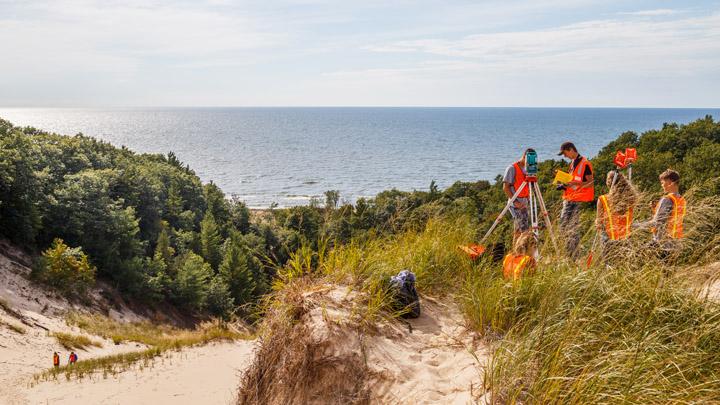First-year students researching Lake Michigan dunes

There were no swimmers that day at the North Ottawa Dunes County Park beach. Wind swept down over the dunes, casting up a fine spray of cold sand which mirrored the choppy waters of Lake Michigan.
Thirty Calvin students filed out of three vans into the beach parking lot. Deanna van Dijk, a professor of Calvin’s GEO department, took charge and led them to an empty pavilion between the beach and the dune. The first-year students huddled in a circle around her while the upperclassmen students unpacked and transported equipment from the vans to the pavilion.
The reason for this mid-October coastal expedition was the First-Year Research in Earth Science: Dunes (FYRES) class, which offers first-year students an opportunity to do actual fieldwork on the dunes of Lake Michigan and complete a core science credit their first semester at Calvin, all while learning about dune formation, ecology, and management.
Van Dijk—who has taught FYRES for seven years—talked to her students about the huge dune they were there to study. It rose in a broad arch behind the parking lot, crisscrossed by sand fences and patchy tufts of dune grass and encircled by a serpentine boardwalk. Van Dijk explained that the dune had been subject to a battery of management strategies after she and several students from Calvin had discovered that it was advancing and threatened to cover a nearby residential area’s sole access road.
Van Dijk then divided the first-year students into four groups, each led by a sophomore or senior student mentor. The mentors distributed equipment, and the groups spent the next several hours roaming the dune, using handheld GPS devices to map erosion, vegetation, litter, and human-made trails.
A formative research experience
Van Dijk notes that FYRES is designed for students of all majors: “You don’t have to be mainly interested in science to take this course, although you do need a willingness to learn, an openness to being outdoors, and an openness to having new experiences.
“Knowledge ahead of time is not required—we provide the knowledge and the training along the way,” she added.
The class typically consists of 24 first-year students and six student mentors. Its first six labs—four of which are spent at the dunes—teach students research methods. The students are then provided with a real-life research question centered on monitoring human impact on the dunes, studying dune processes and characteristics, improving or assessing dune management strategies, or studying endangered species and dune ecology. After spending a week planning out how they’ll answer their research question, students spend three labs implementing their plan at various dune sites.
“The students’ work contributes to understanding and managing the dunes—there are people really interested in what they are doing,” said van Dijk, who explained that many of the questions come from the dune managers and that the research results often impact policy.
Impacting students and creation
Students involved in FYRES say the first-year research experience exceeded their expectations and provided them a great opportunity in their first semester at Calvin.
“Prior to finding FYRES, I didn’t know you could do research as a first-year student,” said April Volzer, a student studying linguistics and music. “I thought you could only do research in later years, so the opportunity seemed really exciting, especially because it has a real impact.”
“I love studying nature and geology, and I want to do research, so this was a perfect first year opportunity," said Simon Detmer, an environmental science and biology student.
“I also wanted to do research, and it was this or studying in a lab with a microscope all day,” said David Martinez-Vasquez, a biology student. “The outdoor aspect really appealed to me, and it seemed like a good way to see if research was actually something I wanted to do with my future.”
Abby Voskuil, another first-year student, added, “It’s good for non-science majors as it doesn’t require a specific background in geology, geography, or environmental studies,” which Voskuil noted she really appreciated as an undecided student looking to fulfill her science core.
Just before the end of the two-hour lab, Hans Leisman, a senior, described his experience of and motivations for returning to FYRES as a student mentor: “It’s cool to get the different perspectives of the first-year students, and I really enjoy being able to do this kind of work again.”
As he scrambled down the dune towards the walkway, he added, “I wanted to be able to give back and facilitate this experience for others—it was such a formative experience for me my first year.”
More information on FYRES can be found at https://calvin.edu/go/fyres/. Incoming students are encouraged to apply by May 10, 2019, although if the class does not fill applications will be reviewed on a first come, first serve basis through the summer.






